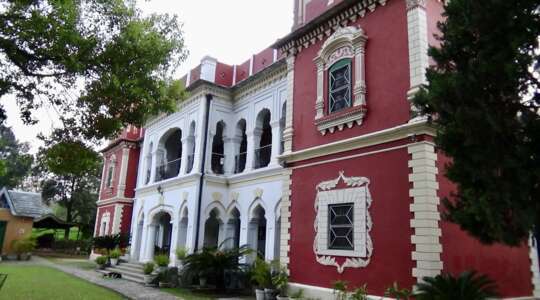Speak to one of our experts now about this offer
Call us on - 0800 092 4444
Or drop into your local Kuoni store to find out more
Speak to one of our experts now about this offer
Call us on - 0800 294 9710
Or drop into your local Kuoni store to find out more
Speak to one of our experts now about this offer
Call us on - 0800 294 9728
Or drop into your local Kuoni store to find out more
Stay on Wah Tea Estate, one of the largest working plantations in the Himalayan Kangra Valley.
The 500-acre estate dates back to 1857. Built from natural materials, the main lodge is also the family home, so there’s always someone around to talk to, providing a warm, homestay feel. Meals are based on what is in season and many of the herbs and spices are from the garden. On hot days, don't miss the chance to try the home made ice cream using peaches from the grounds. Join a tea tour, where you’ll learn about the entire production process on the plantation, from bush to cup. Try your hand at picking some leaves, visit the factory and then taste up to 15 different teas. You can have a picnic in the estate afterwards with freshly cooked samosas and tea leaf pakoras.
Why we love Lodge at Wah
-
You'll be staying close to Dharamshala, home to the Dalai Lama
-
The driveway is lined with peach, apricot and apple trees that attract colourful birds
-
Lodge at Wah is ideally placed for visiting the region’s Tibetan monasteries, forts and riding the mountain railway lines
-
For a small lodge, they have a very strong sustainable approach to their surroundings
Facilities
The food at the lodge is home-cooked and made with produce from the organic gardens, they even press their own oils. Guests particularly enjoy the Kangra Dham, which is a 14-dish thali and a regional speciality made with spices on a wood fire.
There is a yoga shala in the garden where you can meditate, read or take in views of the mountains. A yoga instructor can also be arranged.
Learn the story of tea production on a tour, go bird watching in the grounds or take a walk along the nature trails.
The cottages have been made using natural and local materials and no cement or chemical paints were used in its construction. Glass and copper bottles are used for water and the paraben-free toiletries are in refillable containers. The organic garden supplies many of the ingredients for the meals and they even use beeswax strips instead of clingfilm.
All Hotels in Foothills of the Himalaya
Sorry, your hotel is no longer available
Please check alternatives
-
{{item.body}}
-
{{item.body}}
Choose a departure date
{{store.searchDuration}} nights
Enter rooms & guests
Checking prices & availability

{{term}}, {{formattedDate}} for {{searchDuration}} nights

_w=126_h=31.png?v=d272c1958c6b4383fe76ca13ac1f42e2d91606e9)
_w=24_h=25.png?v=d272c1958c6b4383fe76ca13ac1f42e2d91606e9)
_w=24_h=25.png?v=d272c1958c6b4383fe76ca13ac1f42e2d91606e9)
_w=24_h=25.png?v=d272c1958c6b4383fe76ca13ac1f42e2d91606e9)
_w=24_h=25.png?v=d272c1958c6b4383fe76ca13ac1f42e2d91606e9)